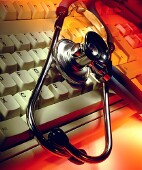
THURSDAY, Feb. 21 (HealthDay News) — Hospitals’ use of computerized ordering systems to process drug prescriptions prevented 17 million drug errors in a single year in the United States — and this technology could prevent more than 50 million drug errors a year if it were more widely used in hospitals, according to a new study.
The study was published online Feb. 20 in the Journal of the American Medical Informatics Association.
“Computerized provider order entry” systems avoid the need to rely on handwritten instructions and provide built-in checks on drug doses and potentially harmful interactions with other medicines. These features help reduce the risk of medication mistakes, according to a journal news release.
In the study, researchers reviewed national data and concluded that computerized entry systems would reduce by half the likelihood of drug errors and reduced these errors by 12.5 percent across the United States in 2008 — meaning the systems prevented 17.4 million drug errors that year.
The researchers found, however, that only one in three acute care hospitals had computerized entry systems by 2008. Larger, urban and teaching hospitals were most likely to have such systems.
About 40 percent of hospitals with electronic ordering systems used the system to process 90 percent of their drug orders, while 42 percent of the hospitals used it less than half the time.
“Despite [computerized order entry] systems’ effectiveness at preventing medication errors, adoption and use in U.S. hospitals remains modest,” wrote researcher Lauren Olsho of Abt Associates in Cambridge, Mass., and colleagues. They added that there is “great potential” for these systems to further reduce drug errors.
“If all U.S. hospitals adopted [computerized entry] systems, assuming constant implementation levels of around 60 percent, 51 million medication errors per year could be averted compared with what would have been expected without [these systems],” the study authors said.
More information
The U.S. Centers for Disease Control and Prevention offers advice about medication safety.

